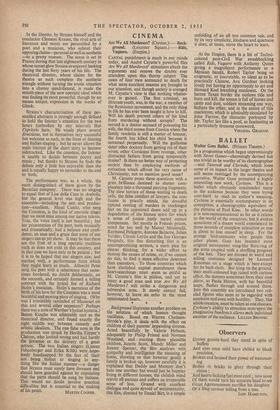CINEMA
Are We All Murderers? (Curzon.)—Back- ground. (Leicester Square.) Ride, Vaquero. (Empire.) CAPITAL punishment is much in our minds today, and Andre Cayatte's powerful film Are We All Murderers? stimulates afresh the arguments and renews the doubts ever attendent upon this thorny subject The cases of four men sentenced to death for what seem excellent reasons are brought to our attention, and though society is avenged M. Cayatte's view is that nothing whatso- ever is gained. The first criminal, an illiterate youth, was, in the war, a member of the Resistance movement, and the only thing in life he has ever been taught is how to kill. Will his death prevent others of his kind from murdering without scruple? The second is a doctor accused of poisoning his wife, the third comes from Corsica where the family vendetta is still a matter of honour, the fourth has killed his child because it screamed perpetually. Will the guillotine deter other doctors from getting rid of their wives, other Corsicans from revenge, other distracted fathers from going temporarily insane? Is there no better way of protecting society than by employing methods of extinction which affront the very name of Christianity, not to mention good sense?
M. Cayatte poses these questions with a grim brilliance destined to shatter com- placency into a thousand piercing fragments. The slow torture of those waiting in death cells, the false comfort of lawyers, the con- fusion in priestly minds, the dreadful tiptoed coming of warders in stockinged feet on the appointed dawn add up to a degradation of the human spirit for which a sense of justice justly meted cannot compensate. Set mostly in Fresnes prison, acted far too well by Marcel Mouloudji, Raymond Pellegrin, Antoine Balpetre, Julien Verdier, Claude Laydu and the boy Georges Poujouly, this fine disturbing film is an uncompromising sermon, a stern plea for clearer thinking, for a wider effort to destroy the causes of crime, or, if we cannot do this, to find a more effective deterrent than execution. To those countries which have abolished capital punishment these heart-searchings must seem as pitiful as M. Cayatte's film is pitiless, and yet to many a good man and true Are We All Murderers? will strike a dangerous and subversive note. It surely cannot fail, however, to leave an echo in the most opinionated heart.
Background illustrates another problem on the solution of which human thought vacillates. Based on Warren Chetham- Strode's play, it deals with the effect on children of their parents' impending divorce. Acted. beautifully by Valerie Hobson, adequately by Philip Friend and Norman Wooland, and . starring three plausible children, Janette Scott, Mandy Miller and Jeremy Spenser, the film analyses with sympathy and intelligence the meaning of home, showing us that however gently a family is broken up, however carefully it is explained that Daddy and Mummy don't hate one another but would just be happier living in different houses, the childish mind rejects all excuses and suffers an irreparable sense of loss. Graced with excellent dialogue and quite devoid of sentimentality, this film, directed by Daniel Birt, is a simple unfolding of an all too common tale, and by its very simplicity, kindness and quietness it does, at times, move the heart to tears.
At the Empire, there is a bit of Techni- colored post-Civil War swashbuckling called Ride, Vaquero with Anthony Quinn giving a magnificent performance as a Mexican bandit, Robert Taylor being so enigmatic, so inscrutable, so silent as to be practically Chinese, Ava Gardner looking lovely but having no opportunity to act and Howard Keel breathing manliness. On the barren Texan border the outlaws ride and burn and kill, the screen is full of horses and cattle and dust, soldiers streaming one way, Indians the other, and in the centre of this maelstrom, which is admirably circulated by John Farrow, the character portrayed by Mr. Taylor lies like a pool, as fascinating as a particularly tiresome crossword.
VIRGINIA GRAHAM.


















































 Previous page
Previous page